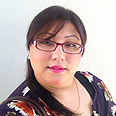
Running for local office, Arab women face hostile society
Patriarchal clans block women's political aspirations, desire for change; 'Men take all the power,' one laments, but another vows: It's time to fight for our rights
They're educated, progressive and want to make a difference, but the patriarchal Arab society buffets their efforts to take part in local politics. However, some intrepid Arab women refuse to heed society's mores and insist on contending in October's municipal elections.
But even these women limit their aspirations to council membership – none dare run for council head. "I thought about these options, but I quickly let go since these decisions are made according to family considerations, not according to ideology or merit," said Daria abu-Eita, director of the Culture Division in the Taybeh municipality.
Related stories:
- Arab employers complain of discrimination
- Arab, Jewish teens meet after Abu Ghosh violence
- MK Zoabi blames police for violence against women
"Women don't have their families and society's support in local politic. It's as if everything is meant only for men. No one will vote for a woman," she lamented.

Abut Eita
Abu-Eita deplored the current situation, in which society, she said, demeans Arab women. "Women have to be involved in politics and party to the decision making process," she said.

Hifa Azzem
"An Arab woman can run any system and manage a municipality, sometimes better than men. Social conventions can always be changed and broken, but it takes time and a lot of effort and struggles."
Abu-Eita's criticism of Arab society were shared by her fellow Taybeh resident and local council candidate, Hifa Azzem, director of the Tala Association for promoting women.
"Unfortunately, the Arab society always tries to silence women and doesn't allow her to be part of local councils' decision making," she said.
"I always said I intend to run for office, but men take all the power. I was ostracized for even thinking about running."
Time to fight
Ibtisam Mahamid from Fureidis, project manager in the Shin Associaiton for equality in representation, thought in the past about running for office but quickly gave up when she realized what forces stand against her. "The idea was born after I took a course in women leadership, but it wasn't enough because Arab society in Israel is still ruled by patriarchal clans. The patriarch of the largest clan decides who will be our leader."
Mahamid deplored women's status in Arab society, which she said excludes them in spite of the times.
But she also had some grief with women themselves. "The Arab woman has managed to study and attain higher education and senior roles, but still women don't have proper self-value," she said.
"There were several attempts by village women who wanted to contend in the elections, but were stopped by a brother, a husband or a cousin, which turned the thing into a familial conflict which often escalates into violence against women.
"Many of them are not considered to be leaders, among other reasons, because of religion."

Mi Badoi
Pharmacist Mi Badoi of Kfar Kassem was not deterred by the opposition and decided to head on and run for the municipal council. "I consider myself a successful woman who can run the municipality even better than men," she asserted.
"It's time to fight for our rights in the elections, and not let ourselves be used only as ballot-dealers. A Kfar Kassem woman deserves to be part of local politics. The fact that I wasn't accepted for the elections shows that there are still elements who wish to demean women."
Some, like political activist Maria Kabha from Kafr Kara, believe that politics are not the only route to influence and change. "I intend to enter politics, but not for any price," she said.
"I think residents should be helped to solve the problems and improve the village. Political office has a price, and I'm at the right age, but there's a significant gap between what there is and what ought to be."
Kabha also had a message for men: "Women must be integrated in the elections and to those who consider it a manly occupation I'll say that they are not aware of women's abilities and their real desire for public work. They ignore it, and don’t want to admit and see the truth since it threatens their social existence in certain systems."
- Receive Ynetnews updates directly to your desktop










